|
<<
PREVIOUS PAGE
The crew went to work and in about an hour
the car was rolling to the starting line again.
Atmospheric conditions by then were almost exactly
the same as they had been for the first lap.
In response to questions on whether he was going
to change anything for the second lap, Rector
told this reporter that he had closed a couple
of fuel jets at the top end of the track. That
would normally feed more fuel into the engine
at the top end making it "fat" and perhaps taking
a little performance away from the engine. He
indicated that he would open those jets for
the second lap and do nothing else. He evidently
had a change of heart and did change a jet in
the barrel valve in the staging lanes.
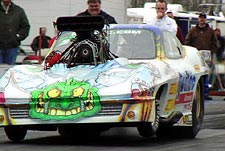 On
the historic 5.985 lap the car left hard again.
Perhaps Rector had "softened" the tune-up a
little as the 60 footer slowed a tad (.967).
Chances are good that the .963 60-footer (which
not too many years ago was a time that a fuel
car would run) from the previous lap had made
him a little nervous and he wanted to make sure
the car didn't go into tire shake. It must have
worked, as the car ran straight, true, and dry
from the hit of the throttle and stormed to
a 5.02 1,000-ft clocking and the record breaking
5.985. On
the historic 5.985 lap the car left hard again.
Perhaps Rector had "softened" the tune-up a
little as the 60 footer slowed a tad (.967).
Chances are good that the .963 60-footer (which
not too many years ago was a time that a fuel
car would run) from the previous lap had made
him a little nervous and he wanted to make sure
the car didn't go into tire shake. It must have
worked, as the car ran straight, true, and dry
from the hit of the throttle and stormed to
a 5.02 1,000-ft clocking and the record breaking
5.985.
"I knew that when he got past the one-two shift
without shake we would run the number," Rector
said later.
Stott took the 'Vette directly to the NHRA-manned
scales and weighed in at 2545. The NHRA tech
crew, on hand for the Sportsman event, immediately
teched the car. The blower was a Kobelco Top
Fuel model and the overdrive actually figured
out to 28.6. It had a two-disc clutch and a
4.56 gear. Not a legal Pro Mod, but certainly
a first cousin. Somehow appropriate for the
Carolinas.
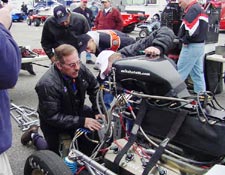 |
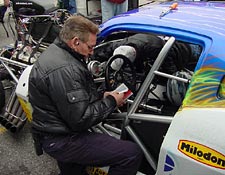 |
| NHRA's Division
2 tech crew, on hand for the sportsman race,
teched Mitch Stott's five-second 'slammer
from the blower overdrive to the rear gear
and found it to be 100-percent legal per
NHRA/IHRA/AMS Pro Mod rules for overdrive,
clutch discs, and rearend ratio. The only
variance from those rules for this car was
its weight -- it rolled across the scales
at 2545 lbs after the pass. Just as a note,
with a full tank of methanol the car probably
pulled to the starting line at 2600 lbs. |
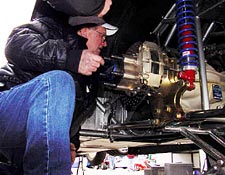 |
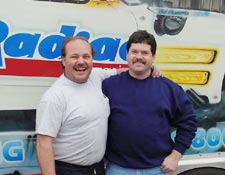
Racer and chassis
builder Tommy Mauney (who built the 'Vette
that Stott broke the record with) put up
$500 to the first in the fives. It didn't
appear to bother him that he had to part
with the "Benjamins" in this photo.
|
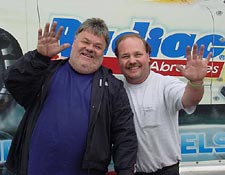
Driver Mitch Stott
(right) and engine builder/tuner Jimmy Rector
hold up five fingers representing their
barrier-breaking five-second doorslammer
lap. |
There is no doubt that atmospheric conditions
had a great deal to do with the performance.
The following day, when temps hovered around
the 70 degree mark, the corrected air was around
1200 feet, and the team had the weight back
in the car, it slowed about two-tenths as did
every other car except Shannon Jenkins' nitrous-powered
Camaro.
So, the five-second barrier, Mitch Stott, Jimmy
Rector and even ancient Darlington Dragway are
a permanent part of drag racing history. And
Mitch Stott can't stop grinning because, after
all, the bottom line is that he is the first
in the fives driving a doorslammer. Unless Mother
Nature provides unique conditions again, and
these cars are allowed to run with the weight
out again then he may hold the title of being
the only five-second doorslammer driver for
a long while.
<
MORE STORIES >
|